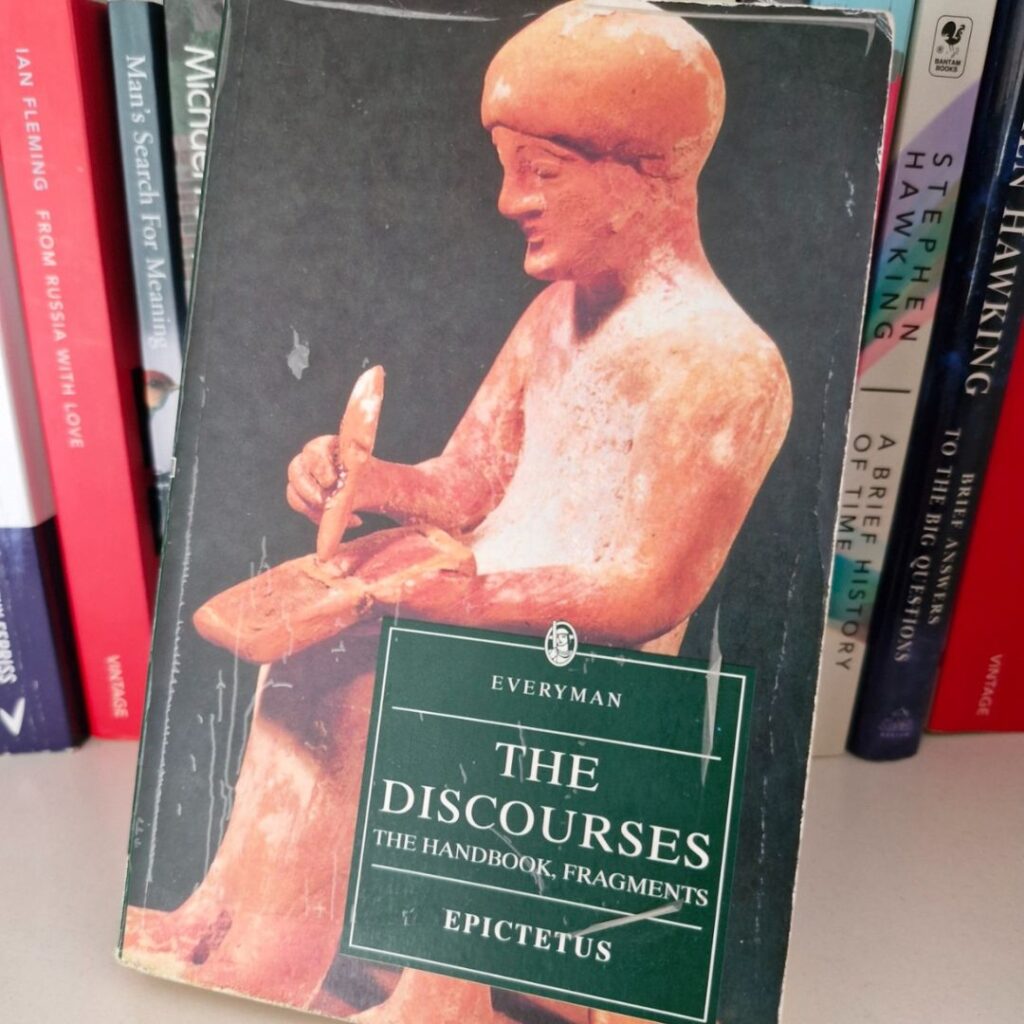
Who Was Epictetus
Epictetus (55 – 135 AD) is one of the most famous Roman-era Stoic philosophers whose teachings have stood the test of time. Yet his life story makes his philosophy even more remarkable, the journey of a man who began as a slave and became the moral influence of an emperor.
He was born in Hierapolis, in what is now modern-day Turkey. His name, Epictetus, means “acquired” or “obtained,” given to him by his master, Epaphroditus, a secretary to Emperor Nero. His real name remains unknown, as do the exact dates of his birth and death.
From Slave to Student
Epictetus spent his early years during Nero’s reign. His master, Epaphroditus, served so close to the emperor that he assisted in Nero’s suicide, and later paid with his own life when Domitian ordered his execution. Somewhere between those events, Epictetus was freed. Whether granted liberty by his master or through circumstance, he became a freedman and devoted himself to philosophy.
He was also physically disabled, lame in one leg. Ancient accounts claim that his master twisted and broke it in a fit of rage, to which Epictetus calmly said, “You will break my leg.” When it happened, he simply replied, “I told you so.” Whether legend or truth, the story captures his calm acceptance, a Stoic lesson in itself.
Even while he was a slave, his master Epaphroditus allowed him to study under Musonius Rufus, one of the most respected Stoic teachers of the time. It wasn’t unusual for slaves to be allowed to study, even subjects like philosophy. This would form his life after he gained his non-philosophical freedom. Rufus’s influence would impact much of his later thought, and references to his teacher appear often in the surviving Discourses.
Epictetus the Teacher
When Epictetus gained independence, he founded his own Stoic school in Rome. It soon became popular among students from across the empire. But in 89 AD, Emperor Domitian expelled all philosophers from Rome. Many were executed; Epictetus went into exile in Nicopolis, Greece, where he established a new Stoic school.
There he taught Stoicism for the rest of his life, and even after Domitian’s death, he chose to remain in Greece. Students and travelers from all regions came to hear him speak.
Of all the Stoics, Epictetus was unique:
- Seneca was a statesman and writer.
- Marcus Aurelius was an emperor.
- Epictetus was a teacher, the philosopher of practice.
The Discourses and the Handbook

Epictetus himself wrote nothing. What survives comes from his student Arrian of Nicomedia, who recorded eight books of Discourses (four remain) and compiled a concise version known as the Enchiridion or Handbook.
Read the summaries of the Discourses Book 1, here.
The surviving Discourses capture the lively dialogues that took place in Epictetus’s school. The more formal lectures on ethics, logic, and physics were likely part of his teaching as well, but they have not come down to us. His method, as we can see from the dialogues, was direct and Socratic, challenging assumptions until reason became clear.
Arrian’s Handbook begins with Epictetus’s most famous teaching — the Dichotomy of Control:
“Some things are up to us and others are not.”
Epictetus, Handbook 1
This simple distinction defines Stoic practice: to focus on what lies within our power, our judgments, choices, and actions, and to accept all else with calm understanding.
The Life of a Stoic
Epictetus lived simply, almost ascetically. It was said that he could leave his door open because he owned nothing worth stealing. Near the end of his life, he adopted a boy and took in a woman to help raise him, an act reflecting the belief, shared with his teacher Musonius Rufus, that family is the foundation of civilization.
He also returned Stoicism to its more orthodox roots, closer to Zeno and the Cynics. His example reminded students that philosophy was not theory but a way of life, practiced through self-discipline, humility, and duty.
Influence on Marcus Aurelius
Arrian, the faithful recorder of Epictetus’s words, later became a prominent Roman official and general in Cappadocia. Through him and through Junius Rusticus, the teachings of Epictetus reached Marcus Aurelius, who thanks his teacher Rusticus in his Meditations:
“And for introducing me to Epictetus’s lectures — and loaning me his own copy.”
Marcus Aurelius, Meditations 1.7
Though they never met, Marcus was still a teenager when Epictetus died; their connection shows the unifying power of philosophy: a former slave inspiring the emperor of Rome.
The Teachings of Epictetus
Epictetus emphasized freedom of the mind over freedom of circumstance. He taught that virtue and reason are the only things truly ours. His Discourses and Handbook outline some of the most practical Stoic ideas; principles that later formed the foundation of the Three Disciplines of Stoicism:
- The Discipline of Desire (What to Seek or Avoid) — learning to desire only what is truly good: moral choice and virtue, which lie within us. External things such as health, wealth, or reputation are preferred indifferents; we may value them, but they are not necessary for a good life. This is the essence of the Dichotomy of Control, perhaps Epictetus’s most famous teaching.
- The Discipline of Assent (How to Think Clearly) — examining our impressions before giving them approval, aligning our thoughts with nature and reason. This helps us distinguish appearance from reality and act only on sound judgment.
- The Discipline of Action (How to Live Well) — acting with integrity, justice, and purpose; doing what is right rather than what is convenient, and fulfilling our duties toward others and the community of humankind.
Epictetus also spoke of:
- The Role of Reason — aligning our minds with nature and logic.
- The Purpose of Philosophy — to live well, not to argue finely.
- The Divine Order (Logos) — the universe as a rational whole, of which we are a part.
For him, philosophy was not theoretical but deeply practical, a way of life to be lived, tested, and refined every day.
He often referred to God or the gods, but in the Stoic sense, not as deities apart from us, but as the rational structure of the cosmos itself.
“Remember that you are an actor in a play the author chooses; if short, then short; if long, then long.”
Epictetus, Enchiridion 17
His teachings remind us that serenity comes from fulfilling our role with integrity, whatever that role may be.
Why Epictetus Still Matters
We need the lessons of Epictetus today more than ever. His focus on responsibility, discipline, and inner freedom offers an antidote to modern distraction and blame. The Discourses and Handbook remain among the most practical moral guides ever written.
You can find summaries and reflections on his works here on Via Stoica, along with a collection of his most powerful quotes.
FAQ: Epictetus and His Philosophy
Who was Epictetus?
A former slave who became one of the most influential Stoic teachers of the Roman era (55 – 135 AD).
What did Epictetus teach?
That freedom comes from mastering our own judgments and actions, not from external circumstances.
Did Epictetus write the Handbook?
No. His student Arrian recorded his teachings and compiled the Enchiridion (Handbook) as a summary.
How did Epictetus influence Marcus Aurelius?
Through Junius Rusticus and Arrian’s writings, Marcus studied Epictetus and shaped his Meditations around those lessons.
Why is Epictetus important today?
Because his Stoic principles, control what you can, accept what you can’t, and act with virtue, remain timeless tools for resilience and peace.
Want to Explore More Stoic Practices?
Book a free consultation with one of our Stoic Coaches to get support. Or read more about How to Practice Stoicism here. Listen to the Via Stoica Podcast on Spotify, Apple Podcasts, or YouTube.
Author Bio
Benny Voncken is the co-founder of Via Stoica, where he helps people apply Stoic philosophy to modern life. He is a Stoic coach, writer, and podcast host of The Via Stoica Podcast. With almost a decade of teaching experience and daily Stoic practice, Benny creates resources, workshops, and reflections that make ancient wisdom practical today.





0 Comments